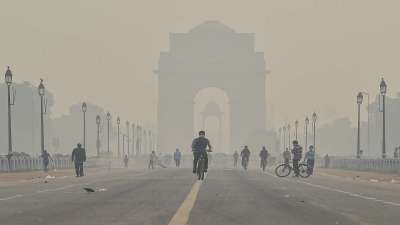
Delhi has introduced stricter measures to combat air pollution as the city’s Air Quality Index (AQI) reached the ‘severe’ category, registering a reading of 428 on Friday morning. All non-essential construction and demolition work has been halted, while restrictions have also been imposed on certain vehicles, according to the Commission for Air Quality Management (CAQM).
The CAQM implemented the third phase of the Graded Response Action Plan (GRAP-3) as of 8 am on Friday, in response to the worsening air quality. Under GRAP-3, petrol vehicles with BS-III emission standards and diesel vehicles with BS-IV standards are now prohibited on roads in Delhi and surrounding National Capital Region (NCR) areas, including Gurugram, Ghaziabad, Faridabad, and Gautam Budh Nagar. Construction projects deemed necessary for national security, healthcare, or certain public infrastructure are exempt from the ban.
The GRAP-3 measures extend beyond traffic restrictions, as the city deploys more mechanized road-sweeping and water-sprinkling machines to help reduce airborne dust. Diesel generators will only be permitted for emergency use.
Delhi Environment Minister Gopal Rai, who earlier today stated that GRAP-3 might not be necessary, acknowledged the rapid deterioration in air quality. “AQI levels remained in the ‘poor’ to ‘very poor’ category since October 14, but over the last two days, we have seen a surge to ‘severe,’” he said. Meteorologists attribute this spike to recent snowfall in the northern mountains, which has lowered temperatures in Delhi and created dry conditions, especially in the mornings and evenings.
With air quality worsening, medical experts are advising residents to stay indoors as much as possible to minimize exposure. “Severe air pollution affects not just physical health but also mental well-being, impacting mood and emotional resilience,” noted Dr. Arunesh Kumar, a senior respiratory medicine consultant at Paras Health in Gurugram. He recommends limiting outdoor activities, especially during early morning and late evening when pollution levels are at their peak.
For those who must venture outside, Dr. Kumar suggests using N95 masks to filter out harmful particles. Indoors, a HEPA air purifier can help reduce particulate matter levels, providing some relief from the effects of the severe pollution.
Delhi’s AQI on Wednesday marked the city as the most polluted in the country, with this week’s surge marking the first time this season that air quality has deteriorated to this extent.
Sources By Agencies




